- Home
- David Downing
Masaryk Station
Masaryk Station Read online
Also by David Downing
The John Russell Series
Zoo Station
Silesian Station
Stettin Station
Potsdam Station
Lehrter Station
The Jack McColl Series
Jack of Spies
Copyright © 2013 by David Downing
All rights reserved.
Published in the United States in 2013 by
Soho Press, Inc.
853 Broadway
New York, NY 10003
Library of Congress Cataloging-in-Publication Data
Downing, David, 1946–
Masaryk Station / David Downing.
p cm
eISBN: 978-1-61695-222-8
1. World War, 1939–1945—Fiction. 2. Historical fiction. 3. Spy stories.
I. Title.
PR6054.O868M37 2013
823’.914—dc23
2012042044
v3.1
For Sacha
Contents
Cover
Other Books by This Author
Title Page
Copyright
Dedication
Abbreviations
February 11, 1948
Crusaders
A Walk into the Future
Stefan Utermann
Sasa
Bearers of light
Merzhanov
Janica
Mordechai’s advice
Sacrificial wolf
Historical addendum
Series Acknowledgments
Abbreviations
BOB Berlin Operations Base (of US intelligence services). Originally run by military intelligence, from September 1947 by the new CIA
CIA American Central Intelligence Agency
CIC Counter-Intelligence Corps of the US Army
CPSU Communist Party of the Soviet Union
DEFA Deutsche Film-Aktiengesellschaft, German film production company founded in 1946 with Soviet encouragement and support
GRU Soviet Military Intelligence
K-5 German security police in Soviet zone, the nascent Stasi.
KI Soviet organisation set up in 1947 to coordinate intelligence services
KPD German Communist Party
MGB Soviet State Security service responsible for intelligence and counter-intelligence between 1946 and 1953.
OUN Organisation of Ukrainian Nationalists, founded in 1929 and later allied to the Nazis
SPD German Social Democratic Party
UDBA Yugoslav State Security
YCP Yugoslav Communist Party
February 11, 1948
They were on their way to bed when the two Russians arrived, but the lateness of the hour was apparently irrelevant—she and her sister were to come at once. She asked if they knew who she was, but of course they did. Refusal wasn’t an option.
Their destination was also secret. ‘Very nice house,’ the one with some German told them, as if that might make all the difference. He even helped her into the fur coat. Nina looked terribly scared, but the best she could do was squeeze her older sister’s hand as they sat in the back of the gleaming Audi.
Soon the car was purring its way eastward along a dimly lit and mostly empty Frankfurter Allee. The men in the front exchanged an occasional word in Russian, but were mostly silent.
Like thousands of others she’d been raped in 1945, but only on the one occasion. The three soldiers had been too excited by her house and possessions to do more than satisfy their immediate lust.
And now, she feared, it was going to happen again. In a ‘very nice house’.
She could feel her sister quivering beside her. Nina had only been twelve in 1945, tall for her age, but luckily still with the chest and hips of a child, and so the soldiers had left her alone. She had blossomed since, but was still a virgin. This was going to be so much harder for her.
They were leaving the city behind, driving through snow-covered fields. Three years after the war, the road signs caught in the headlamp beams bore Cyrillic script, and she had only the vaguest idea where they were. Not that it mattered.
They turned off the road up a tree-lined drive, and swung to a halt before a large three-storey house. There were soldiers on guard either side of the door, and another inside who gave them both a curious look. There was only one man in civilian clothes and he had a classic Russian face. This was an enemy camp, she thought. There wouldn’t be anyone there to whom they could appeal.
They were hustled upstairs and down a richly carpeted corridor to a door at its end. One of their escorts tapped it lightly with his knuckles, then responded to words from within by pushing it open and ushering them inside.
It was a large room, with several armchairs and a large four-poster bed. A fire was burning in the grate, and several electric lamps were glowing behind their shades, although the light was far from bright. She had never been in a brothel, but she imagined the better ones looked like this.
And then she saw who it was, and her heart and stomach plummeted.
He was wearing a dressing gown, and probably nothing else. The smile on his face was only for himself.
After calmly locking the door, he walked to a table holding several bottles, poured himself a tumblerful of clear liquid, and gulped half of it down. As he turned back to them the fire briefly glinted in his spectacles.
‘Zieh dich aus,’ he said. Take off your clothes.
‘No,’ Nina almost whispered.
‘We must do as he says,’ she told her sister.
Nina stared back at her. There was fear in her eyes, and pleading, and sheer disbelief.
‘Take me,’ she begged him. ‘She’s only a girl, take me.’
If he understood her—and she thought he did—all it did was increase his impatience.
They slowly stripped to their underwear, pausing at that point without much hope.
He gestured for them to continue, and then stared at their naked bodies. She watched his growing erection strain at the dressing gown, then finally break free. Nina’s gasp made him smile. He took two steps forward, grabbed her wrist, and tugged her towards the bed.
Nina jerked herself free and ran for the door, which rattled loudly but resisted her attempt to pull it off its hinges. As he crossed the room in pursuit, she tried to block his way, but he grabbed her by the arm and casually threw her aside.
Nina grabbed a convenient ashtray, and hurled it in his direction. She didn’t see where it struck him, but the grunt of pain as he doubled over left little room for doubt.
For a few brief seconds the world stood still.
Then he gingerly walked to his desk, and took a gun from the drawer.
‘No,’ she screamed, scrambling towards him.
He lashed out with the barrel, catching her across the cheek as it knocked her to the carpet.
Nina had sunk to her knees, and now he stood before her, his penis dangling in front of her face. He lifted her hair with the gun, and slowly moved around her, his erection returning.
She thought he would force the sobbing girl to take him in her mouth, but what could she do to step in that wouldn’t make things worse?
And then he was had the barrel of the gun in the nape of Nina’s neck, and his finger was pulling the trigger. There was no explosion, just a coughing sound, an almost derisory spurt of blood, a silent Nina crumpling on to the carpet.
She tried to speak, to rise from the floor, but both were beyond her.
He came across the room, gun in hand. Expecting to die, she felt almost disoriented when he pulled her up by her hair, and threw her face down on the bed. There was cold metal in the back of her neck, but his hands were wrenching her legs apart, and she knew there was one last thing to endure before sh
e joined her sister.
And then he was ramming himself inside her, urgently pumping away. It only lasted a few seconds, and once he was out again, she lay there waiting for an end to it all, for the blackness the bullet would bring.
It didn’t come. After several moments his hands reached down for one of hers, and cradled it around the butt of the pistol. At first she didn’t resist, and by the time she realised the implication, he had taken it back again.
‘You’re too famous to kill,’ he said in explanation.
Crusaders
The Russian was almost certainly lying, but John Russell had no intention of sharing this suspicion with his British and American employers. If there was one thing he’d learnt over the last few years, it was never to divulge any information without first thoroughly assessing how much it might be worth in money, or favours, or blood.
The British major and American captain who shared command of the Trieste interrogation centre seemed less inclined to doubt the Russian. A kind reading of the situation might have them lacking Russell’s suspicious nature, although one would have thought that a necessary qualification for intelligence officers. Being about half Russell’s age and coming from two different realms of Anglo-American privilege, they certainly lacked his experience of European intrigue. But having said all that, a third explanation for their naivety—that both were essentially idiots—seemed by far the most likely.
The Brit’s name was Alex Farquhar-Smith, and Russell would have bet money on a rural pile, minor public school, and Oxford. At the latter he had probably spent more time rowing than reading, and only been saved from a poor Third by a timely world war. The Yank, Buzz Dempsey, was a Chicago boy with a haircut to suit his name, and a brashness only slightly less annoying than his English colleague’s emotional constipation. Usually they spent most of their working hours getting up each other’s noses, but today they were both too excited.
The source of their exhilaration was the tall, rather elegant, chain-smoking Soviet major sitting on the other side of the table. ‘I have some information about the Red Army’s battle order in Hungary,’ Petr Kuznakov had casually mentioned on arriving in Trieste the previous day, as if unaware that such intelligence was the current holy grail of every American and British officer charged with debriefing the steady stream of defectors and refugees from Stalin’s rapidly coagulating empire. That had made Russell suspicious, as had the Russian’s choice of Trieste. Had his superiors calculated that the chances of encountering real professionals would be less in such a relative backwater? If so, they’d done their homework well.
The Russian lit another cigarette and said, for the fourth or fifth time, that the MGB would be frantically looking for him, and that he would be of no use to ‘the great world of freedom’ if his new friends allowed him to be killed. Surely it was time to move him somewhere safe, where they could discuss what sort of life they were offering in exchange for everything he knew?
Russell translated this as faithfully as he could; so far that day he had seen no potential benefit in concealing anything specific from the two English speakers.
‘Tell him he’s quite safe here,’ Farquhar-Smith said reassuringly. ‘But don’t tell him why,’ he added for the third time that morning, as if afraid that Russell had the attention span of a three-year-old.
He did as he was told, and was treated to another look of hurt incomprehension from Kuznakov. Russell had a sneaking feeling that the Russian already knew about the tip-off, and the two Ukrainians in the Old City hotel. He said he was worried, but the eyes seemed very calm for a man expecting his executioners.
With that thought, the telephone rang. Dempsey answered it, while the rest of them sat in silence, trying in vain to decipher the American’s murmured responses. Call concluded, they heard him go outside, where the half-dozen soldiers had been waiting all morning. A few minutes later he was back. ‘They’re on their way,’ he told Russell and Farquhar-Smith. ‘They’ll be here in about ten minutes.’
‘Just the two of them?’ Russell asked, in case Dempsey had forgotten.
‘Yeah. You take Ivan here out to the stables, and we’ll come get you when it’s all over.’
‘But don’t tell him anything,’ Farquhar-Smith added. ‘We don’t want him getting too high an opinion of himself.’ He gave the Russian a smile as he said it, and received one back in return.
They deserved each other, Russell thought, as he escorted the Russian across the courtyard and down the side of the villa to the stable block. There were no horses in residence; all had been stolen by the locals three years earlier, after the Italian fascist owner’s mysterious plummet down the property’s well. A horsey odour persisted still though, and Russell took up position outside the entrance, where the sweeter smell of pine wafted by on the warm breeze, his ears listening for the sound of an approaching vehicle. Kuznakov had asked what was happening, but only belatedly, as if remembering he should. There was watchfulness in the Russian’s eyes, but no hint of alarm.
In the event, the two Ukrainians must have parked their car down the road and walked up, because the first thing Russell heard was gunfire. Quite a lot of it, in a very short time.
In the enduring silence that followed, Russell saw the look on Kuznakov’s face change from slight trepidation to something approaching satisfaction.
The birds were finding their voices again when Dempsey came to fetch them. The two would-be assassins were lying bloody and crumpled on the courtyard stones, their British killers arguing ownership of the shiny new Soviet machine pistols. Neither of the dead men looked particularly young, and both had tattoos visible on their bare forearms which Russell recognised. These two Ukrainians had fought in the SS Galician Division; there would be other tattoos on their upper arms announcing their blood groups. Strange people for the MGB to employ, if survival was desired.
There was no sign that Dempsey and Farquhar-Smith had worked it out. On the contrary, they seemed slightly more respectful toward their Soviet guest, as well as eager to continue with the interrogation. Not that they learned very much. Over the next three hours Kuznakov promised a lot but revealed little, teasing his audience with the assurance of a veteran stripper. He would only tell them everything when he really felt safe, he repeated more than once, before casually mentioning another cache of vital intelligence that he could hardly wait to divulge.
It was almost six when Russell’s bosses decided to call it day, and by that time the four of them could barely make one another out through the fug of the Russian’s cigarette smoke. Outside the sky was clear, the sun sinking behind the wall of pines which lined the southern border of the property. Leaving Farquhar-Smith to sort out the nocturnal arrangements, Russell and Dempsey roared off in the latter’s jeep, and were soon bouncing down the Ljubljana road, city and sea spread out before them. There was already an evening chill, but the short drive rarely failed to raise Russell’s spirits, no matter how depressing the events of the day.
He had been in Trieste for two months now, having been loaned out by the American Berlin Operations Base—‘BOB’ for short—for ‘a week or two’, after the local Russian interpreter’s wife had been taken ill back home in the States. At this point in time, all the American intelligence organisations in Europe—and there were a bewildering number of them—had only three Russian speakers between them, and since Russell was one of two in Berlin, a fortnight’s temporary secondment to the joint Anglo-American unit in Trieste had been considered acceptable. And by the time news arrived that his predecessor had died in a New Jersey highway pile-up, a veritable flood of interesting-looking defectors had stumbled into Trieste with stories to tell, and Russell had been declared indispensable by Messrs Farquhar-Smith and Dempsey. A replacement was always on the way, but never seemed to arrive.
In truth, Russell wasn’t altogether sorry to be away from Berlin. He missed Effi, of course, but she was currently shooting another movie for the Soviet-backed DEFA production company, and he knew from long exp
erience how little he saw her when she was working. The German capital was still on its knees in most of the ways that counted, and over the previous winter the threat of a Soviet takeover had loomed larger with each passing week. Having failed to win control of the city’s Western sectors through political chicanery, the Russians had opted for economic pressure—exploiting the Western sectors’ position deep inside the Soviet Zone, and their consequent reliance on Russian goodwill for all their fuel and food. Until a couple of weeks ago, it had all seemed little more than gestures, but on April Fool’s Day—a scant twenty-four hours after the US Congress approved the Marshall Plan—the Soviet authorities in Germany had upped the stakes, placing new restrictions on traffic using the road, rail and air corridors linking Berlin with the Western zones. This had continued for several days, until a Soviet fighter had buzzed an American cargo plane a little too closely and brought them both down. Since then, things had got back to normal, although no one knew for how long.
Berlin’s intelligence outfits would still be in a frenzy, and that was something worth missing. His American controller Brent Johannsen, though a decent-enough man, was handicapped by his ignorance of Europe in general and the Soviets in particular, and his misreading of the latter’s intentions could be downright dangerous to his subordinates. Russell’s Soviet controller Andrei Tikhomirov was usually too drunk to bother with orders, but in January he and Yevgeny Shchepkin had been farmed out to one of the new K-5 whizkids, a young Berliner named Schneider, who seemed to think the best way to impress his Russian mentors was to behave like the Gestapo.
No, Effi might be calling him home, but Berlin most definitely wasn’t.
Trieste was a monument to failure, a city crowded with people who only wanted to leave—it often reminded Russell of a film called Casablanca, which he’d seen during the war—but the food and weather were a huge improvement on Berlin’s. And the ‘Rat Line’ story Russell had been working on for over a month was making him feel like a journalist again. Over the last three years he had almost forgotten how much he enjoyed digging up such stories, sod by clinging sod.

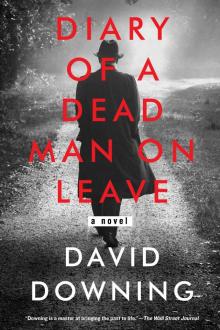 Diary of a Dead Man on Leave
Diary of a Dead Man on Leave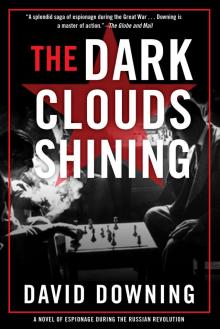 The Dark Clouds Shining
The Dark Clouds Shining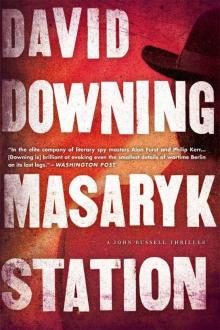 Masaryk Station (John Russell)
Masaryk Station (John Russell)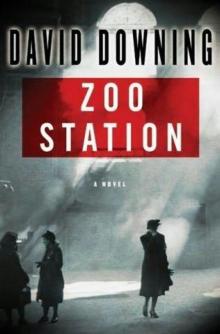 Zoo Stationee
Zoo Stationee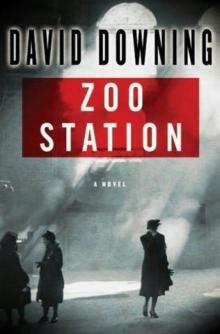 Zoo Station jr-1
Zoo Station jr-1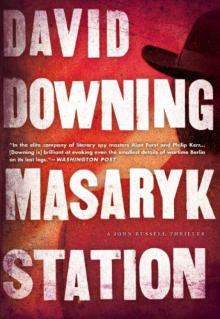 Masaryk Station
Masaryk Station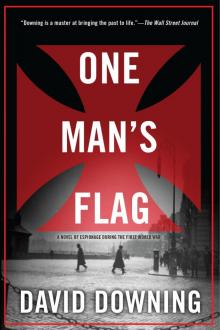 One Man's Flag
One Man's Flag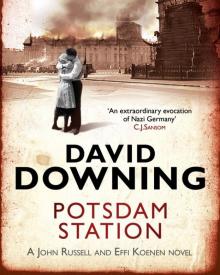 Potsdam Station jr-4
Potsdam Station jr-4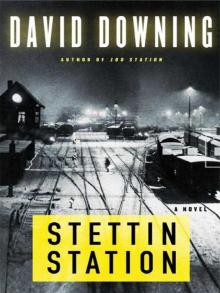 Stattin Station jr-3
Stattin Station jr-3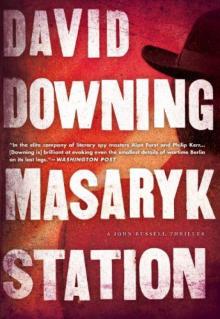 Masaryk Station jr-6
Masaryk Station jr-6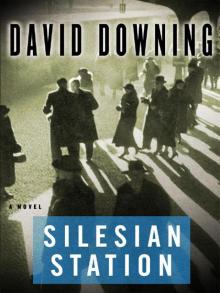 Silesian Station (2008) jr-2
Silesian Station (2008) jr-2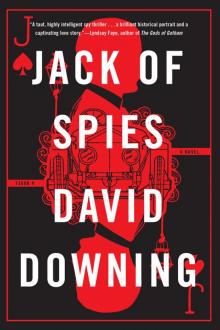 Jack of Spies
Jack of Spies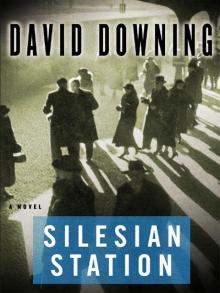 Silesian Station (2008)
Silesian Station (2008) The Moscow Option
The Moscow Option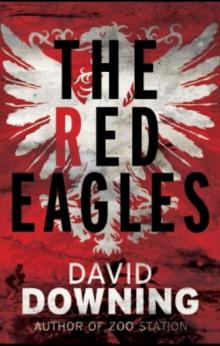 The Red Eagles
The Red Eagles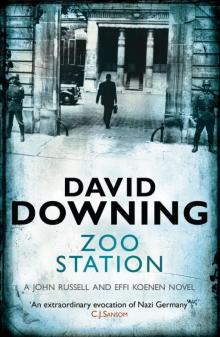 Zoo Station
Zoo Station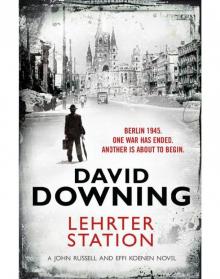 Lehrter Station
Lehrter Station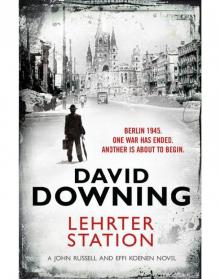 Lehrter Station jr-5
Lehrter Station jr-5